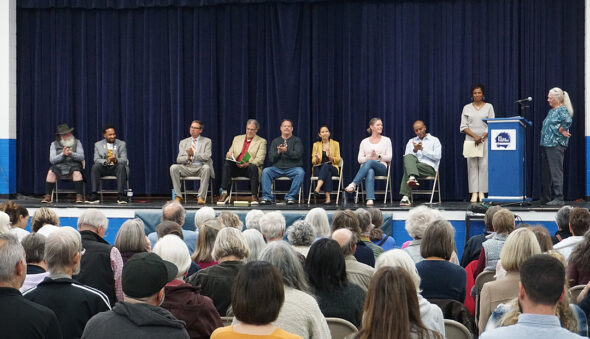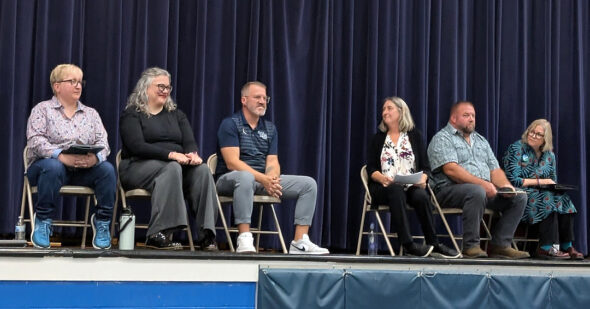
Mayoral candidates Mark Heise and Steve McQueen; Council candidates Brian Housh (incumbent), Dino Pallotta, Scott Osterholm, Angie Hsu, Stephanie Pearce and Senay Semere. Moderating the Council/mayor Candidates Night was Marsha Bonhart; at far right is Kate Anderson Carrigan, president of the McKee group. (Photo by Reilly Dixon)
Vote-seekers sound off at James A. McKee Candidates Nights
- Published: October 28, 2025
Villagers packed the Mills Lawn gym Wednesday and Thursday, Oct. 15 and 16, for the Candidates Night community forums, hosted by the James A. McKee Association.
The forums were an opportunity for the candidates running for public office to introduce themselves publicly to the community, answer questions and engage in dialogue with one another ahead of the Nov. 4 General Election.
Voters will choose between six candidates to fill three Village Council seats, two candidates for Yellow Springs mayor and three candidates to fill two Miami Township Trustee seats. Three candidates are running uncontested for the three available seats on the Yellow Springs Board of Education.
Running for mayor are Mark Heise and Steve McQueen; for Council are Brian Housh, Dino Pallotta, Scott Osterholm, Angie Hsu, Stephanie Pearce and Senay Semere; for Trustee are Lori Askeland, Jed Hanna and incumbent Marilan Moir; for school board are Kim Reichelderfer, Kristi Nowack Myers and Paul Herzog.
Oct. 15: Council and mayor
The Council and mayoral candidates kicked off the first of the two Candidates Nights, and while there were some areas of difference in their platforms, there was considerable overlap in their priorities.
Affordable living, an economically healthy downtown, better communication and improved municipal infrastructure were ambitions the six Council candidates raised, albeit from varying angles.
In his opening salvo, Brian Housh — the only incumbent running for reelection — said that increasing the village population may be the solution to several of the municipal woes — namely generating more property taxes and adding more potential customers to struggling shops and stores.
“A little more growth will not only help us with revenues, but also in terms of keeping our downtown vital and supporting our local businesses,” Housh said.
Somewhat in the same vein, Dino Pallotta said in his introductory remarks that a thriving downtown and attracting new industry to the Center for Business and Education were chief among his interests, if elected.
“Growing the business community is the most effective way to increase revenue without raising taxes,” he said, later adding that the Village could leverage its lodging tax to further promote downtown businesses.
There were several other candidates like Pallotta, the owner of Dino’s Cappuccinos, who own or work in downtown Yellow Springs businesses, and see their reported struggles firsthand.
Angie Hsu, who co-owns MAZU, noted that affordable housing and successful downtown Yellow Springs businesses are inextricably linked.
“You are only as good as your staff,” she said. “We need to think creatively so local workers can continue to live in Yellow Springs.”

The first Candidates Night was on Wednesday, Oct. 15, showcasing mayoral and Council candidates for the Nov. 4 election. (Photo by Reilly Dixon)
That idea of both living and working in Yellow Springs came up several times.
“Wages are not living wages for the average rent or house payment in Yellow Springs,” Stephanie Pearce said. “By nurturing local entrepreneurs and existing businesses, we can lift them up and in turn, help them raise their wages. We should be seeking and incentivizing purpose driven industries.”
Senay Semere, whose spouse owns two downtown salons, said his background in economic development gave him the know-how to work with organizations such as the Small Business Association and Small Business Development Centers to bring needed capital to downtown Yellow Springs.
“I have the experience and the relationships to make sure that Yellow Springs gains as much as it gives,” Semere said.
Creating more affordable housing was not only Scott Osterholm’s focus at the forum, but also in recent months in his role as a member of Planning Commission.
“I’m very, very pro-apartment right now,” Osterholm said, later stating that he voted affirmatively this summer for the proposed 96-unit rental complex at the former Antioch College Student Union because he always strives to “do what’s best for the majority.”
“If not there, where? If not now, when?” Osterholm asked rhetorically.
Candidates differed in their opinions on those proposed apartment plans.
“I’m for apartments, but not for that particular project,” Pearce said, calling the potential tax abatements that may be offered to the developer “foolish and irresponsible.”
“We haven’t agreed to any tax abatements yet — they’re still in negotiation,” Housh clarified, and added, “I believe it’s been transparent and these discussions are just beginning.”
Semere and Hsu advocated for better communication between the Village and neighbors of any future project.
“We need apartments. We need housing,” Semere said. “But local issues should go to those who are most affected first. The local community, my neighbors, were not against the development. They just wanted a voice during the process, not at the end of the process.”
Similarly: “I would be interested in seeing how we can better communicate with residents — especially those most affected — about changes,” Hsu said. “I think there’s been a similar experience with Short Street. People feel they weren’t included in the process and were blindsided.”
At several points, the scope of the discussion on stage broadened to include matters of politics beyond Yellow Springs.
For one, Pallotta addressed recent criticisms of his political affiliations.
“I am a mainstream Republican, and I won’t shy away from that,” he said. “Full disclosure, I have made modest contributions to the party totaling $270 since 2020. More significantly, we have donated over $18,000 to Yellow Springs community programs and organizations during that time.”
Pallotta added: “I do not agree with everything in the party, but I do agree with the core tenet of being fiscally conservative and socially responsible. This philosophy dovetails perfectly with the current financial challenges we’re facing.”
Even the mayoral candidates were challenged to address macro-politics. McQueen and Heise were asked how they would respond if they were informed Immigration and Customs Enforcement, or ICE, agents were in Yellow Springs — both said they would take action.
“I’m not a fan of ICE or anything [the President Trump] administration is doing,” McQueen said. “If given the position of mayor, I’d talk directly to the chief of police as well as police officers to come up with a plan. I’d go directly to the community, find out who would be targeted and be on the front lines.”
“Steve and I agree,” Heise said. “What’s happening in our country is despicable. We have a moral responsibility, as long as it doesn’t cross the law. … We need to protect all our villagers, even those who may not have the right piece of paper.”
While both mayoral candidates were aligned on most issues broached last Wednesday, their approach to advocating for Yellow Springs varied slightly — McQueen said his focus will be on those within the village, and Heise said he will be geared to those beyond the village.
“We need to go out into the state — the larger community — to promote Yellow Springs as a place that’s welcoming to everyone,” Heise said.
By contrast: “It’s time, through events and service … to become neighbors again. We need to become tighter as a community,” McQueen said.
Both mayoral candidates sought to continue the progressive path laid down by outgoing Mayor Pam Conine, especially in Mayor’s Court. Heise said, if elected, he’d expand the court’s hours so as not to inconvenience or force time off work for those summoned. McQueen stressed the importance of adjudicating with social justice in mind.
“You’re not facing a regular system attempting to oppress you,” McQueen said to a hypothetical defendant, “but one that is trying to help you. Knowing you have an ally in leadership is important.”
Similarly, Heise said: “As mayor, I would take a look at the individual and the individual situations of those in marginalized groups — the person themselves — and make sure they get justice. Not retribution, but true justice.”

Top, from left: School board candidates Kim Reichelderfer, Kristi Nowack Myers and Paul Herzog; and Trustee candidates Marilan Moir (incumbent), Jed Hanna and Lori Askeland. (Photo by Lauren “Chuck” Shows)
Oct. 16: Township and school board
Villagers returned to the Mills Lawn gym Thursday, Oct. 16, for the second Candidates Night, this one featuring candidates for Miami Township Trustee and the Yellow Springs Board of Education.
Three are running for two open Township Trustee seats: Lori Askeland and Jed Hanna, and incumbent Marilan Moir. All three spoke to land stewardship and fiscal responsibility.
Askeland, a former Village Council member and longtime Wittenberg University professor, said she’s running because she loves the township’s “beautiful natural preserves and farmlands” and believes good local government is “one of the strongest tools we have to protect what we love — our land, our water, our people.”
“Our first real challenge is basic organizational management — the Township has grown more complex … but its internal systems haven’t really kept pace,” Askeland said. “If something is everybody’s responsibility, it can become nobody’s responsibility until somebody panics and does it, and we can’t have that anymore.”
She said she would bring “steady, transparent, organized and people-centered” leadership to Township government, emphasizing clear budgeting, stronger procedures and “a forward-looking budgeting process that aligns operational spending with long-term capital planning.”
Hanna, a 25-year Miami Township resident, said he would bring a strong rural voice to the board. He described his family’s 150-year-old farm on Cedarville-Yellow Springs Road as where he “learned the value of hard work, community and stewardship of the land.”
“I believe in a rural perspective that honors our agricultural heritage while planning responsibly for the future,” he said. “Public safety is non-negotiable.”
Hanna said, if elected, he would focus on maintaining roads and cemeteries, protecting farmland from annexation and ensuring that fire and EMS have “the resources, staffing and equipment they need to respond quickly and effectively.”
Moir, who is seeking a second term, said the Township is “in the midst of a very transitional time” following a “generational turnover” in staff across multiple departments. She said she hopes to continue stabilizing operations and building on the professionalization of MTFR.
“Despite dramatic headlines, we have a lot of camaraderie and joy in our work at Miami Township,” Moir said. “The improvements we’ve made in the last couple of years is something that I’m very proud of … but we have more work to do.”
Moir said that includes developing a long-term capital plan for vehicles and equipment and improving fiscal oversight.
“We’ve lived with more of a break-fix model,” she said. “That’s not cost-effective, and it’s not worthy of our first responders.”
The three candidates also responded to audience questions, several of which addressed ongoing issues in Township government.
Asked about staffing levels for fire and EMS, Moir said the department has added two full-time staff per shift, creating greater consistency in coverage and teamwork.
“Rather than trying to patch in part-time employees, two firefighters who can predictably work together … every three days become more than the sum of their parts,” she said.
Hanna said: “We just need to have personnel there ready at all times. If somebody makes a phone call, they need to be there instantly.”
Askeland added that Moir was responsible for helping hire consultant Fred Kauser to restructure MTFR’s staffing model, and noted that having well-maintained and up-to-date equipment is “a really important recruitment strategy.”
Responding to an audience question about handling conflict amongst Trustees, Askeland pointed to Robert’s Rules of Order, the standard guidelines for conducting orderly and fair public meetings, which she said she learned in 4-H at a young age.
“If you don’t have a motion on the floor, then you’re not having a discussion,” she said. “It just helps people focus.”
With public meetings in mind, in response to a question about the democratic process, Moir said that clearer procedure and policy are foundational to bringing the broader public into Township work: “You need to go to the root of the problem, which is procedure and policy. As you start to put those in place, you’ll see the symptoms disappear.”
The topic of solar development, particularly the contested Kingwood Solar project, drew strong opinions. Hanna, who was a named intervener in the case, said: “There is a place for solar, but I don’t see the place in Greene County. … I don’t see why you should have 1,500 acres altogether put into solar panels on soil that can raise a beautiful garden or any other kind of crop.”
Moir noted that “large, industrial solar has all but been chased from this county,” but said the Township could still look at smaller-scale systems: “Our zoning commission has decided not to create regulations to allow that, and I hope that over the years they will.”
Questions about Township budgeting prompted detailed responses. Moir said Miami Township operates on a $2.1 million budget, about 75% of which goes to MTFR.
“We just need to plan better,” she said. “We could really tighten up in our fiscal officer’s office — there’s a little bit of guesswork. … We lost a 20-year fiscal officer … and got a new one this year, and it’s been a rocky landing.”
Askeland said she found the Township’s lack of forward-looking budgeting “kind of alarming,” while Hanna said, “A new fire engine will be about a million dollars, if not bought in the next four years. It could be a million and a half by then, [so we need] to budget for that.”
Several questions centered on community engagement and communication. Askeland said she would like to hold work sessions open to the public so trustees can dialogue openly in a “fishbowl-style” setting.
“There’s always a balance … between inviting in as many voices as possible and making sure [meetings are] efficiently run,” she said.
For his part, Hanna said the best way to ensure transparency is “to run a meeting as it should be, without compromise and doing good for our Township.”
The evening also featured the three uncontested school board candidates — Paul Herzog, Kristi Nowack Myers and Kim Reichelderfer — who each said they are committed to maintaining the district’s values and supporting teachers and administrators.
Herzog, a longtime community volunteer, said his priorities include collaboration and communication.
“Positivity, communication, confidence, collaboration, consistency and organization … are all things I pride myself on,” he said.
Myers, a veteran public school English teacher, said she’s running “because public education is the foundation of a healthy democracy.” She expressed concern about “harmful legislation” from the state level, including bills that would defund or politicize public schools.
“We need the state to stop shifting tax dollars to private schools who lack the financial and educational oversight that public schools face,” she said.
Reichelderfer, a mechanical engineer and parent of three Yellow Springs students, said she is focused on seeing the district’s facilities project completed “responsibly, on time and within budget.” She also stressed the need for professional collaboration and a “respectful school board culture.”
“We don’t have to agree on everything,” she said. “In fact, good leadership depends on a diversity of perspectives — but how we communicate matters.”
When asked how they would support district teachers and staff, Reichelderfer said, “They’re our biggest asset.”
Herzog agreed, saying: “Open lines of communication, constant collaboration, listening — making sure that everybody’s needs are met equally.”
Myers added: “We are not superintendents. … We need to listen to and trust our administrators … and trust our teachers. The best gift we can give them is to trust them, respect them, listen to them and work with them.”
As the evening wrapped up, moderator Fred Bartenstein praised the forum’s attendees for maintaining what he called “the most civil audience I’ve ever worked with.”
Election Day is Tuesday, Nov. 4. For more information about local races and ballot issues, see the Yellow Springs News Election Guide, available in print at the News office or online at https://www.ysnews.com.
The Yellow Springs News encourages respectful discussion of this article.
You must login to post a comment.
Don't have a login? Register for a free YSNews.com account.












No comments yet for this article.